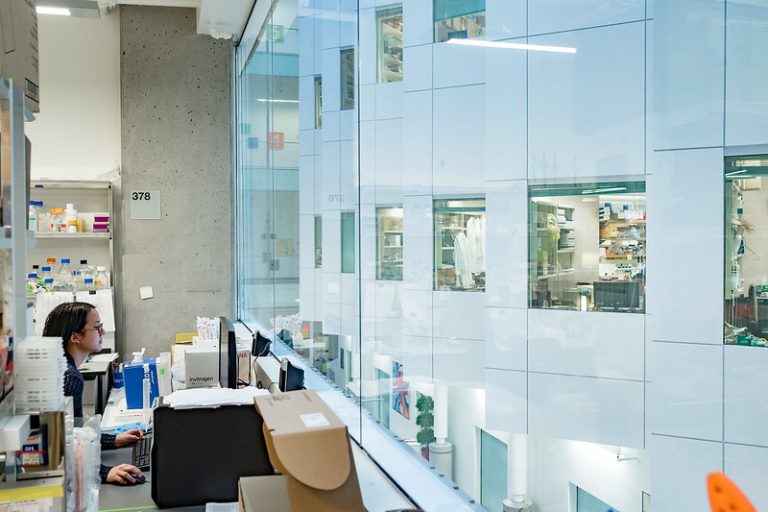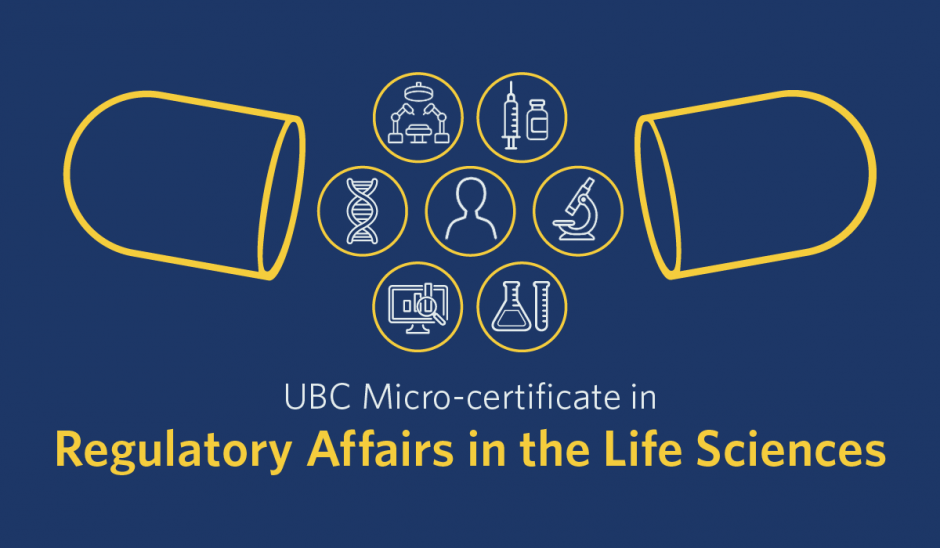
The ATM receives funding from the BC Ministry of Advanced Education and Skills Training to develop a new micro-credential in Regulatory Affairs in the Life Sciences

UBC’s Academy of Translational Medicine (ATM) is excited to announce that its proposal, Micro-credentials in Regulatory Affairs for the Life Sciences, has been awarded $157,093 by the BC Ministry of Advanced Education and Skills Training (MAEST). British Columbia has the fastest growing life sciences sector in Canada, and regulatory expertise is vital to the continued growth of the sector. With this financial support, the ATM is offering a new UBC Micro-certificate designed to provide an understanding of regulatory affairs and regulatory science to industry professionals and to students and faculty looking to improve career prospects and help bring health products to market.
The micro-certificate consists of two online courses that will run back-to-back September to November 2022. The first course provides an overview and introduction to regulatory affairs, while the second course explores the emerging discipline of regulatory science, including health economics, post-market surveillance and regulatory reform. The courses can be taken individually, or stacked into a UBC Micro-certificate
The ATM regulatory affairs micro-certificate is developed and delivered in partnership with UBC Extended Learning (ExL) using the ExL online learning and registration platform. The online courses include instructor-led sessions, facilitated discussions and in-person workshops in Vancouver. A remote virtual option is available for the workshops so the program can be completed 100% online.
For course details and registration, please visit the UBC Micro-certificate in Regulatory Affairs in the Life Sciences.
More information about the emerging field of micro-credentials in the broader education landscape as well as at UBC can be found here.
This new regulatory affairs micro-credential program is led by the Chair of the ATM Regulatory Advisory Council (RAC), Dr. Dean Regier. The RAC, which consists of members from industry and academic institutions both locally and internationally, has been crucial in providing guidance on course and curriculum. You can read more about Dr. Regier’s perspectives on the important role regulatory affairs can play in bringing new health innovations to patients quickly here.
In 2021, the MAEST developed a micro-credential framework for BC and dedicated a total investment of $5 million to develop and implement micro-credentials at public post-secondary institutions. These micro-credentials are designed for British Columbians who want to take advantage of employment opportunities in growing sectors throughout the province.
“As our economy continues to recover from the pandemic and adapt to our new world, we need to provide more up-skill opportunities to better support the needs of our workforce,” said Ravi Kahlon, Minister of Jobs, Economic Recovery and Innovation. “Micro-credentials are a bridge for workers to enhance their skills and take advantage of job openings in high-demand fields.”
More information about the MAEST micro-credential framework for BC’s public post-secondary education system can be found here.
UBC’s Academy of Translational Medicine and UBC Extended Learning offer a new micro-certificate in Regulatory Affairs in the Life Sciences

With financial support from the BC Ministry of Advanced Education and Skills Training, the UBC Academy of Translational Medicine (ATM) has partnered with UBC Extended Learning to offer the UBC Micro-certificate in Regulatory Affairs for the Life Sciences. This program consists of two five-week part-time courses, which will run back-to-back September to November 2022, that can be taken separately or stacked into a UBC Micro-certificate.
British Columbia has the fastest growing life sciences sector in Canada, and regulatory expertise is vital to the continued growth of the sector. This new micro-certificate is tailored to the unique bio-innovation landscape of BC and will equip learners with highly sought-after skills critical for the life sciences, biotechnology, biomanufacturing, medical device and pharmaceutical industries.
The first course, Introduction to Regulatory Affairs, provides an overview of the Canadian and global regulatory affairs landscape and its major stakeholders, and covers basic tools for evaluation safety and efficacy, regulatory requirements for clinical trials, and regulatory process pathways for medical devices. The second course, Regulatory Sciences and Health Economics, explores the emerging discipline of regulatory science, including real-word evidence, adaptive clinical trial design, patent law, health economics, post-market surveillance and regulatory reform. The two courses are five weeks each, with an average weekly commitment of 5−7 hours.
This online program combines self-paced independent study, weekly facilitated online sessions, and on-campus workshops that includes real-world UBC case studies. A remote virtual option is available for the workshops.
Spaces are limited, and are first-come, first-served. A limited number of financial subsidies are available to UBC Faculty of Medicine students, trainees and faculty members, as well as under-served learners.
Read more about the course on the ATM website
Establishment of the ATM Education Advisory Council

The creation of the Academy of Translational Medicine (ATM) Education Advisory Council is a vital milestone to implementing the ATM’s education platform to support BC and Canada’s translational medicine ecosystem.
The Council’s core mandate would be to guide the development of a comprehensive and interconnected suite of educational programs supporting all levels of translational medicine, and meeting the pressing workforce needs of local industry to support a vibrant ecosystem of life science research and technology in BC.
Establishing the Education Council is one of the many actions that the ATM and the Faculty of Medicine are taking to accelerate the translation of new discoveries into real-world impact.
Following a preliminary meeting in February, 2022, the Director of the ATM, Dr. Poul Sorensen, is announcing that the Council has been established. The Council has already begun their work providing guidance on the development of two new micro-credential courses in regulatory sciences as part of the ATM education platform, which were recently funded by the BC Ministry of Advanced Education and Skills Training.
The Council membership and terms of reference will be finalized and approved in the coming months.
Applications for the Creative Destruction Lab are Open

To apply to the CDL program, you will be asked to follow these steps:
- Step 1: Express your interest – We’ll send you a confirmation email with more information about CDL.
- Step 2: Understanding CDL – In your confirmation email, you can either start your application or watch a webinar to learn more about our program
- Step 3: Start your application – Sign up for your CDL Application Portal account, set-up your company profile, and start your application
NOTE: IF YOU ARE APPLYING TO EITHER THE QUANTUM OR BLOCKCHAIN STREAMS,PLEASE SCROLL TO THE BOTTOM OF THE PAGE FOR THESE SEPARATE APPLICATIONS.
Prepare for your Application
- Review CDL’s specialized stream offerings
- Watch a 15-minute webinar for an overview of the program
- Browse CDL mentors who help our founder set objectives
- Consider these topics/questions before beginning you application in the CDL Application Portal:
- An informed understanding of CDL locations and stream selection
- An overview of your company
- Your team’s background
- The core technology (and its differentiation)
- Funding and revenue information
- Why CDL?
Applications close at 11:59PM Eastern on July 31, 2022. Interviews will be held in August 2022.
Due to COVID-19, CDL has developed the capability to deliver the program online. Each CDL location will follow the guidance of local public health officials to reevaluate opportunities to transition back to in-person sessions and activities.
Apply here




